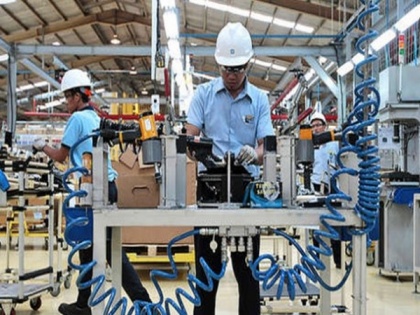Consumer Price Index for industrial workers for March stood at 133.3, up 0.6 points
By ANI | Published: April 29, 2023 10:55 PM2023-04-29T22:55:54+5:302023-04-29T23:00:09+5:30
New Delhi [India], April 29 : The All-India Consumer Price Index-Industrial Workers (CPI-IW) for March increased by 0.6 points ...

Consumer Price Index for industrial workers for March stood at 133.3, up 0.6 points
New Delhi [India], April 29 : The All-India Consumer Price Index-Industrial Workers (CPI-IW) for March increased by 0.6 points and stood at 133.3, official data showed on Saturday.
The Labour Bureau under the Ministry of Labour and Employment compiles the Consumer Price Index for Industrial Workers every month on the basis of retail prices collected from 317 markets spread over 88 industrially important centres across the country.
The maximum upward pressure in the current index came from Fuel and Light group contributing 0.25 percentage points to the total change, the ministry said in a release.
"At item level, cooking gas/LPG, firewood and chips, hospital/nursing home charges, medicine allopathic, motor cycle/scooter moped, toilet soap, tooth paste, arhar dal, cow milk, dairy milk, fish fresh, pure ghee, apple, banana, cauliflower, brinjal, cabbage, bitter guard, french bean, lemon, peas, cumin seed/jira, cooked meal are responsible for the rise in the index," the release said.
However, this increase was largely checked by wheat atta, rice, potato, onion, drum stick, lady finger, tomato, grapes, soyabean oil, sunflower oil, mustard oil, cotton seed oil, poultry chicken, and egg-hen.
At the centre level, Ahmedabad recorded a maximum increase of 3.3 points followed by Jamshedpur and Gurugram with 3.2 and 3.1 points respectively.
Separately, in India, headline consumer price index-based (CPI) inflation (or retail inflation) has gradually declined from 7.8 per cent in April 2022 to 5.7 per cent in March 2023.
The Reserve Bank of India sees retail inflation declining to 5.2 per cent in the full year of 2023-24, lower than the 5.5 per cent attained in 2021-22 which was mostly free of the impact of the Russia-Ukraine conflict.
RBI has been engaged in necessary policy actions to counter inflationary pressures and support growth.
The Reserve Bank of India, in its first monetary policy review meeting in 2023-24, decided to keep the key benchmark interest rate the repo rate unchanged at 6.5 per cent, to assess the effects of the policy rate tightening done so far on various macroeconomic parameters.
Barring the recent pause, RBI has so far raised the repo rate, the rate at which it lends to banks, by 250 basis points cumulatively since May 2022 in the fight against inflation.
Raising interest rates is a monetary policy instrument that typically helps suppress demand in the economy, thereby helping the inflation rate decline and vice versa.
Disclaimer: This post has been auto-published from an agency feed without any modifications to the text and has not been reviewed by an editor
Open in app